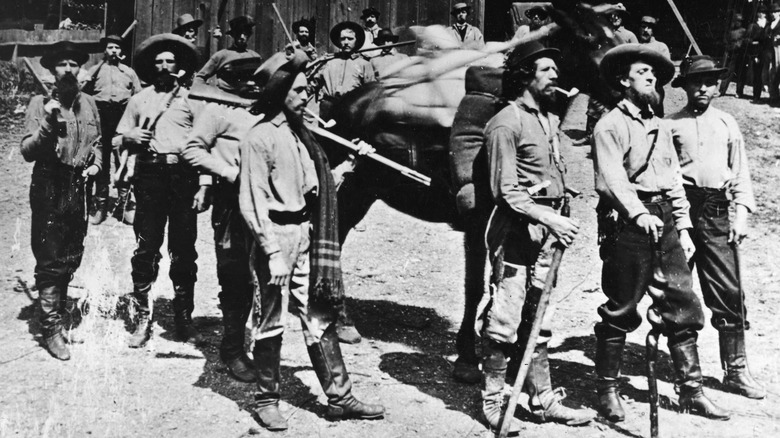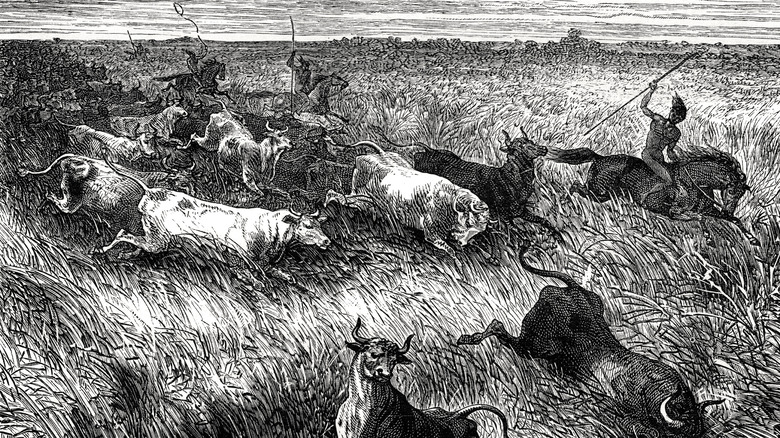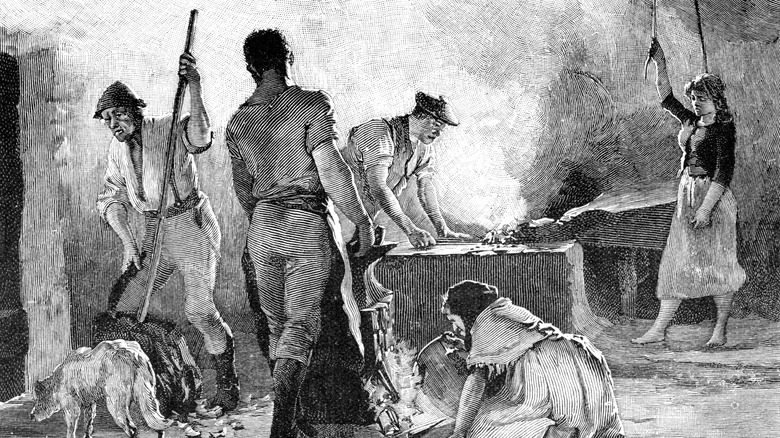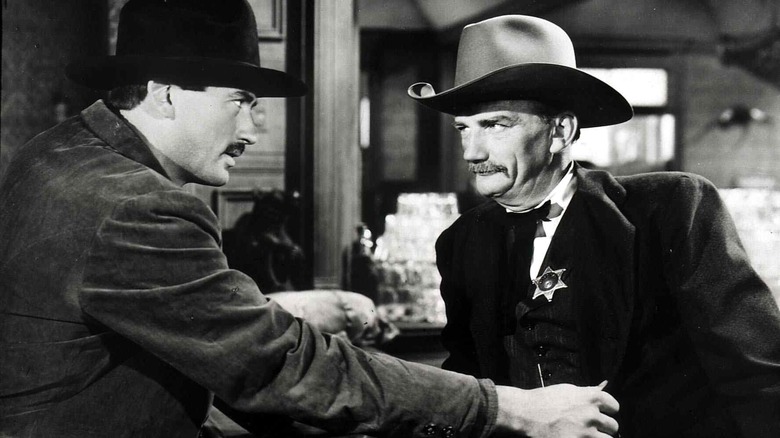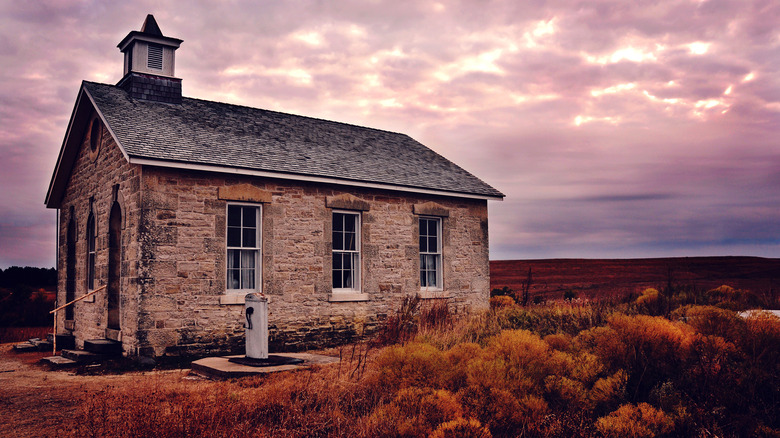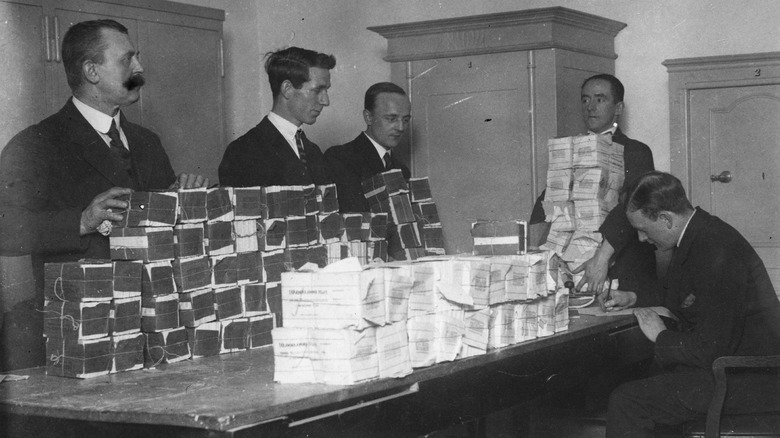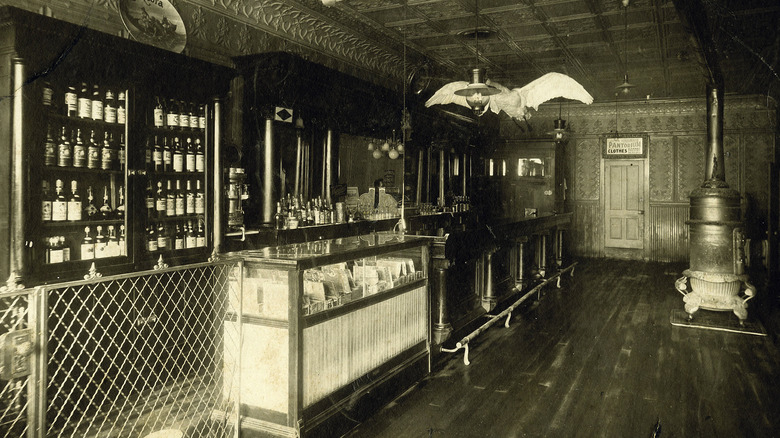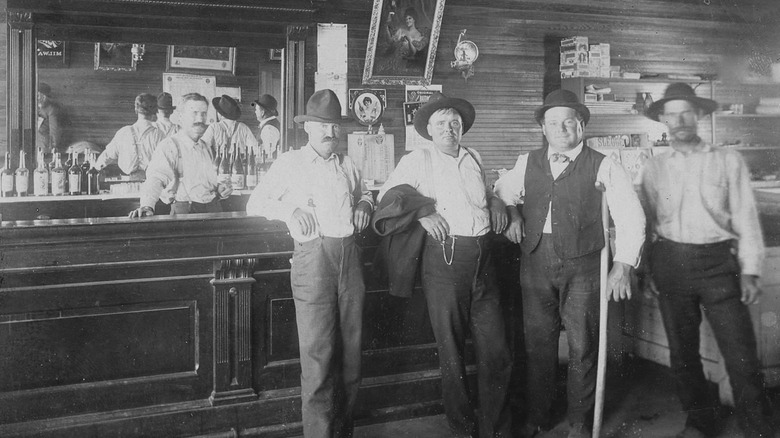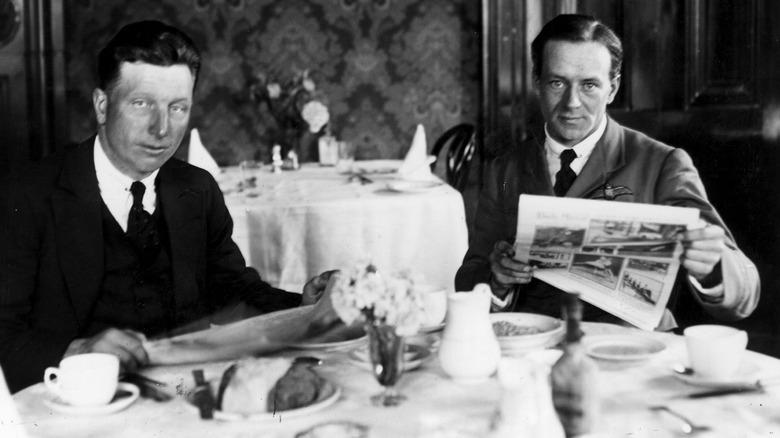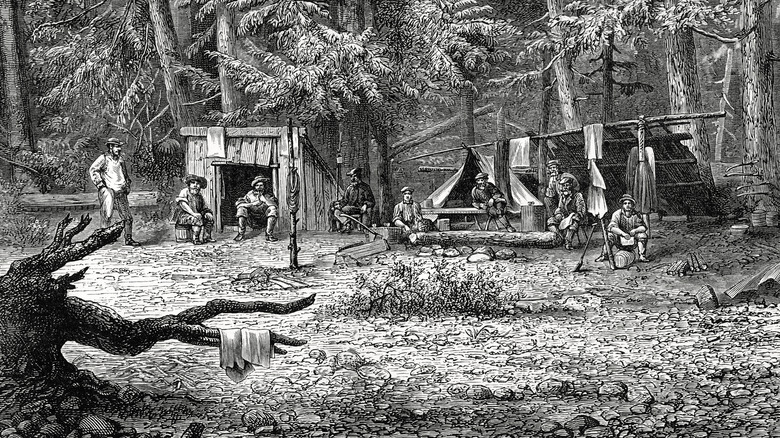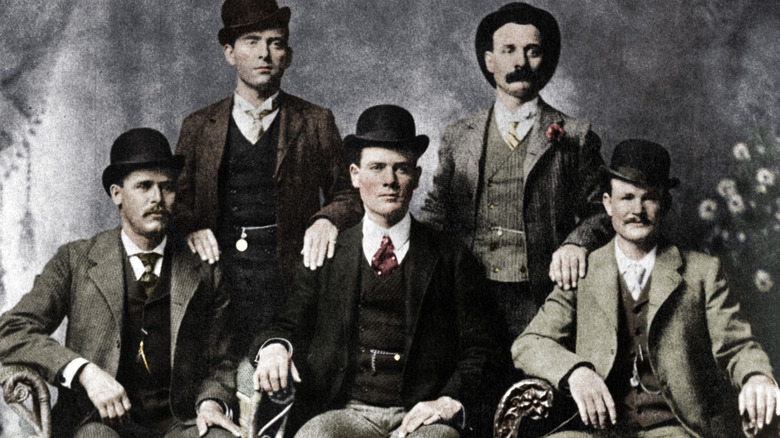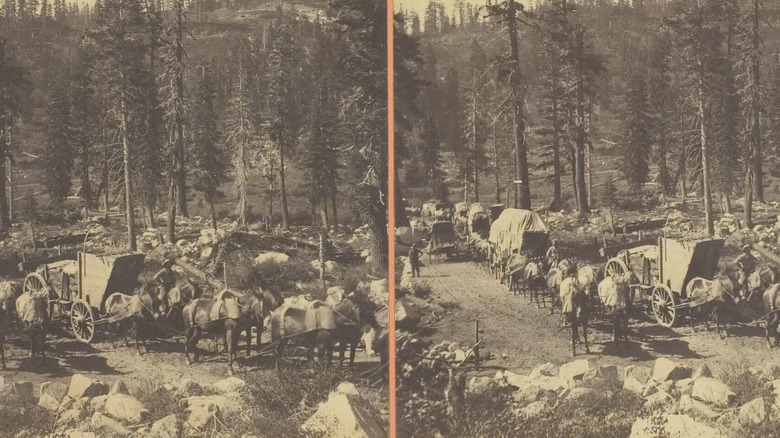What People In The Wild West Did For Work
There are few periods of American History more glamorized than the Wild West. Gun-toting, leather-vested outlaws robbing trains and banks and seemingly getting away if not for the long hand of the desert law. Sheriffs, deputies, and the good folk banding together and putting a stop to the crime. It gave rise to the stardom of actors like John Wayne, playing the quintessential hero against Bruce Cabot, the quintessential villain.
But while this is the narrative that rises to the top about the Old West, there are many other components that lingered underneath, not least of all the way of life of everyday workers that kept society moving. After all, what would bandits have to rob if not for bankers and railroad workers, and what would lawmen have to protect? While it was a completely different world to what we see today, there were still businesses, towns, and an organized society, and that means the necessity to find work, pay for a living, and live a relatively comfortable life, as much as is in any given person's power.
So let's look at what people back then/out there did do for work. You may be surprised how many jobs aren't too far from what people still do to this day.
Cowboy
We'll go ahead and get the most popular, romanticized job out of the way. The American West "cowboy" is often the life getting framed on the big screen, but the job itself wasn't always as glamorous as Hollywood would have us believe. In its simplest form, the cowboy was responsible for one thing — protecting the cattle on the ranch that employed them, according to History. After all, bandits and outlaws knew how much cattle were worth, and without protection — and sometimes with it — cattle were known to go missing.
The ironic thing is that while cowboy is such an Americanized job, the actual cowboy originated in Mexico, per American Cowboy. Known as vaqueros, the "Mexican cowboy" had the same job description as the "American cowboy" — protecting and overseeing cattle. The resume of a vaquero and/or cowboy needed to include very specific things, such as roping, lassoing, herding, and riding, which would all be used to keep cattle together and to bring stragglers back to the pack.
Cowboys made a decent living, earning anywhere between $25 and $40 a month (via History), which, when equated to the modern day, is about $950 to $1500. They had to earn it though, with days extending far beyond the modern eight-hour workday, oftentimes going near double that.
The job as a mainstream occupation largely died out by the 1920s. With that said, there are still cowboys today. According to the U.S. Bureau of Labor Statistics, there were 847,600 jobs in 2021 for "farmers, ranchers, and agricultural managers," of which cowboys would fall. The bureau projects a 3% decline in employment, however, from 2021 to 2031.
Blacksmith
Not as glamorized as many other jobs in the Old West, the blacksmith may well have been one of the most steady and profitable jobs anyone could have. According to Old West Iron, there was no better time to be a blacksmith than during the time of the Wild West. As the retailer of rustic hardware explains, in the first half of the 1800s, blacksmiths were so in demand, you could consider it a "golden age" for the profession.
And it makes sense why. In a developing community where construction was crucial, who else had the expertise to provide the tools people needed? Everything from hammers to horseshoes was required on a daily basis, and it was a blacksmith's job to keep them in circulation. Not to mention all the farming equipment, such as plows, shovels, and the like, that also needed to be made.
Blacksmiths made a good deal of money. According to Working the Flame, blacksmiths would have made anywhere between $1 to $1.50 a day to repair equipment, and $5 or so dollars a day to create new equipment. Equating that to the modern day, that means they could make somewhere between $30 and $200 per day, never mind if they worked on two things at once.
It even fell to blacksmiths to repair carriages (via Old West Iron), which added even more money to the trade and to the blacksmith's diversified portfolio of services. In fact, blacksmiths made such a nice living wage in the Wild West that they kept on paid apprentices to help with the daily operations while learning the trade themselves (via Working the Flame).
The Law
"The Law" doesn't have the best reputation out in the Old West, but that is largely due to movies glamorizing the outlaws — Jesse James, Butch Cassidy, Billy the Kid, all names that most people can at least identify as Wild West outlaws. But according to History Extra, while gunfights and outlaws certainly did exist, the actual extent of "lawlessness" was not that widespread.
HowStuffWorks breaks down the basic law structure of the Old West and highlights how, without organized law, townsfolk had to make their own arrangements. This led to establishing lawmen like sheriffs, deputies, and bounty hunters to round up the bad guys, and lawyers, judges, and executioners to see that they never bothered anyone again. But U.S. Marshals were also common in more established Western towns, and while some outlaws made a killing, few made it for long.
Working for the American West "law" provided a good deal of danger, but also a fair amount of opportunity given the sheer amount of positions that needed filling. Practically every town had at least a sheriff, bounty hunters roamed the land looking to collect massive rewards on wanted criminals, and judges were required to pass verdicts. Granted, there was always room for corruption. As History Extra notes, some towns became known as outlaw towns, where their names gave them away — these were towns run by outlaws.
Teacher
The job of a teacher has been important since literally the beginning of time. Someone has to teach the next generation all they need to know and give them the tools to learn even more. And much like today, the job of a teacher in the American West was underappreciated, though not as much as you might think. While certain establishments such as saloons always seemed to have the most importance in Wild West settlements, education was far from ignored.
The famous image of a one-room prairie schoolhouse is not actually all that far off. They were quite common on the American frontier, according to Wild West magazine (via HistoryNet), and they made the teaching duties that much more difficult because a single teacher had to accommodate various age ranges of children in their classroom. That meant dedicating time to each age group, creating appropriate lessons and learning, and keeping the other kids entertained or otherwise engaged while the teacher's attention was pulled elsewhere.
Banker
Thanks to frequent Hollywood depictions of bankers getting the worst of the "lawlessness" of the Wild West outlaw, this may seem like one of the most dangerous professions in the Old West, but that isn't necessarily the case. Sure, there were robberies and gun-toting patrons, but bankers could count on steady and relatively safe employment in any given American West town.
Banks in general varied in ownership, with some being owned by private investors, as well as some being owned by bigger outlets like the Hudson Bay Company, and later Wells Fargo, according to EH.net (the Economic History Association). With the discovery of gold in California, countless banks sprang up to help protect (and grow) the wealth of the lucky individuals who cried "Eureka!" This would have provided even more employment on the frontier for all manner of bank workers, from owners down to the tellers.
Per the American Bankers Association, it wasn't until 1863 that the United States created an official national banking system, which in turn led to the standardization of currency transfers between banks. Which, again, added even more security to the employment within banks, given the added trust people would have had in them. Gone were the days of "wildcat banks" (via EH.net) that took huge deposits, then moved away with those deposits. Regulation brought stability to the Wild West.
Business owner/worker
These all get lumped together because there were so many businesses in frontier towns that all required the same general sort of employee. While working as a sheriff or blacksmith brought with it a specific skill set and responsibility, the other businesses that populated the American West required everyday workers with more transferrable skills. Between hotels, restaurants, saloons, and the like, the employment situation was opportunistic and wide-ranging. Every business had an owner, every owner needed workers to keep their business running smoothly and generating money.
For restaurants, that meant having servers, hosts, cooks, and cleaners. While restaurants weren't too fancy, given the reliance on local resources, there were still various dishes served revolving around eggs, bread, and beef, according to True West Magazine. As the 20th century neared, fancier foods made their way out West, including oysters, and this would require even more specialization from cooks and staff.
Hotels, like restaurants, weren't like what we see today either. They were often dingy and dirty. As True West notes, few even had a single bathtub, instead encouraging their patrons to wash in the local creek. And not all patrons even got their own room. Most shared a common room, almost like a version of today's hostel, though likely much dirtier. Regardless, workers were still required to keep operations going. Even if amenities were a bit lacking.
Barkeep
It's hard to find anything more quintessentially "Wild West" than the saloon, and that's because practically every town had one, and they were a source of massive profit. According to Wild West magazine (via HistoryNet), there was one reason why: It was easy to start one up. All a prospective saloon owner needed was some form of shelter, perhaps some seating, and some kind of alcohol. Just like that, you've got a saloon.
As noted by the Sierra Sun, saloons were often the first building to pop up in any given frontier town. Work was tough on the frontier, and people needed a place to cut loose. Which meant for plenty of opportunities for those seeking employment. It was also a very easy "come as you will" kind of work. People that were out of work, or looking to get into another career path, need only barkeep for a bit, save up some money — and the money was there to save — and then move on to whatever else they wanted to do other than serving rowdy patrons, per Wild West magazine.
And as the outlet further explains, while the quality of the saloon ran the gambit from tent and picnic table to two-story luxury, the workers required only varied by the size of the establishment. The more the saloon grew, the more workers it needed. It wasn't just the barkeep, either. The saloon also employed someone to run the gambling operations, porters, shoeshiners, tobacco room operators — saloons were ripe with employment. It just wasn't always savory.
Newspaper
While there are many jobs in the Old West that tend to fit the general narrative of what life out there was like, this probably isn't one of them. Yet it was surprisingly prevalent. The newspaper business may be on the decline in the digital age of today, but back during the days of the American frontier, newspapers were alive and thriving.
Tucson, Arizona, alone boasted five different newspapers (via American Studies @ UVA), all stationed in the same town that only had 465 denizens as of the 1831 census, per Desert Archaeology Inc. That's just under one newspaper company for every 100 people. And that doesn't even include the magazines that were also published out West. There's a whole list compiled by Encyclopedia.com and there are a lot.
Those daily words didn't write themselves. The paper didn't print itself. The operations didn't run themselves and the papers didn't deliver themselves. These were all jobs required by each and every small newspaper and magazine. While the actual reading material of the papers themselves spanned the gambit, according to UVA, from news to political opinion, seeing as how an individual could print a paper and circulate it around town, there was plenty of opportunity for the enterprising writer who had something they felt was worth sharing.
Miner
Nowadays, mining is often seen as a job lacking in glamor, and in the coal mines of the East Coast, the danger was far heavier than the profit. But on the American frontier, while you didn't necessarily lose the danger aspect, you could count on a much higher potential for profit. After all, there is a significant difference between coal and gold. Out West, miners were digging for gold and silver at a time when one good dig and a handful of nuggets could lead to immediate and often lifelong wealth. In fact, it was this quest for gold that led to the settling of numerous towns on the Western frontier, per the Meeting of Frontiers (via the Library of Congress).
However, while gold and silver kicked off the mining industry out West, it grew to include iron, copper, oil, and gas as well (via Legends of America). Which, of course, meant more opportunity for profit, which in turn led to the employment of more individuals eager to make a living. Naturally, though, it wasn't all glitz and glamor in the mines. Far from it. Safety was secondary, and health was ignored.
According to True West Magazine, a study at one particular mine in Butte, Montana, saw miners dying from tuberculosis at 10 times the national average. It didn't take long to connect the dots to the dust present in the mining operation, which likely would have been found across numerous other mining operations as well.
Bandit
No matter how much bandits and outlaws did or didn't affect everyday life in the Wild West, they still existed, some more successfully than others, but that means that it has to count as one form of employment. If the draw of teaching or running a bank didn't appeal, you could just saddle up and go on the lam, pillaging and stealing to your heart's content in the name of better living.
Honestly, the line of banditry isn't that dissimilar from business tycoons of the modern day. You have the few that rise above the pile — Jesse James, for instance (via History) — and a whole bunch of next-tier outlaws that had varied success while never hitting that level of fame.
All that said, the Wild West wasn't as wild as Hollywood would have us believe, and the law very often won the day in the end. In fact, even one of the most famous gunfights of all time — the infamous shootout at the OK Corral — only lasted for all of 30 seconds, according to History Extra. The lawlessness that sprang from it was scattered and short-lived, as were most of the big hits that popularize the glamor of being an outlaw in the Old West.
Railroad
As with any industry, the more it grows and spreads, the more employment opportunities spring up along with it. Mining was a great example of that, as more and more miners were needed to reap the rewards of the land, but the railroad industry was another in the Old West that was ripe with employment opportunities. In fact, it was such an opportunity in such great abundance that there weren't enough people to staff it entirely.
With the expansion of the Central Pacific Railroad, the sheer amount of labor needed varied widely. According to PBS, 4,000 laborers were needed at any given time, and they were only to drum up about 800. HowStuffWorks estimates that 14,000 laborers were needed overall. Whatever the number, the West could not meet the demands of the employment market and in order to meet the requirements, Central Pacific had to turn to Chinese immigrants to supply the manpower. Between the Union Pacific and the Central Pacific Railroad, over 1,700 miles of tracks were laid, which equates to an insane amount of labor.
Wages weren't exactly outstanding, with the monthly wage ranging from $800 to $1,200 by modern standards, according to PBS, but one way or another, a lot of money was flying around in the railroad business — just one of the many ways people lived and worked in the Wild West and ultimately, developed the American frontier.
